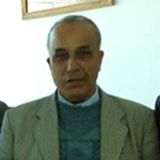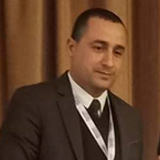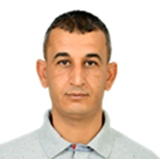Prof. Lamjed MARZOUKI
×
Mr. Lamjed Marzouki is a professor in the Higher Institute of Biotechnology of Beja, University of Jendouba, Tunisia.
Dr. Yossra Menchari
×
After obtaining her PhD in Populations biology in 2007 from University of Dijon, she got in 2008 a permanent position as an assistant professor in Plant biotechnology at the ISBB (University of Jendouba). Her main research topic is the “genetics and evolution of herbicide resistance in weed populations.
Dr. Sebai Hichem
X
Hichem Sebai, is an associate professor in the Higher Institute of Biotechnology of Beja, University of Jendouba, Tunisia. He gets his PhD in 2009 from Carthage University. He is a coordinator of practical works from 2008 to 2011. A member of the Scientific Council since 2011. A coordinator of the Master "Technology Applied to Dairy and Meat " (2012-2017). A coordinator of the Master "Functional Agro-Resources» (2017). A coordinator of the Master " Food and health» since 2018. He is a head of the animal biotechnology department from 2014 to 2017, and Director of the Higher Institute of Biotechnology of Beja since 2017. Also he is a founding member and treasurer of the Tunisian Association of Biotechnology and Bio-Resources Valorization since 2013 and member of the national sectoral commission in biological sciences since April 2018. He is a member of The World Academy of Sciences (TWAS) 2018-2022. His research activities are directed towards the study the chemical composition of some medicinal plant extracts and essential oils, their antioxidant capacities as well as their protective properties against chemical and biological molecules (metals, loperamide, castor oil, sulfiric acid, Dextran sulfate, alloxan sodium nitroprusside, High Fat Diet, LPS.......)- induced oxidative stress, metabolic, and digestive system disorders such us ulcer, colitis and esophagitis.
Dr. Samir ABBES
×
Dr. Samir Abbès is an associate professor at the high institute of biotechnology of Béja (ISBB) Jendouba University (Tunisia). He earned his MSc in Environnemental Sciences in 2002 and his PhD in Biological Sciences in 2007 from Carthage University (Tunisia). He earned his Universitary habilitation certificate from Jendouba University in 2014.He is a member in the Laboratory of Genetic, Biodiversity and Bio-ressources Valorization. He was interested in the field of food mycotoxin-contamination and immuno-physiological effect of fungal toxin in animal and humain. His dissertation subject is the use of bioactive compounds, clay mineral, probiotic bcteria as feed-additive against mycotoxin contaminated diet in order to prevent livestock toxicity. He is now a partner and shareholder in research project, where He specialize in searching natural minerals, bio-molecules from plants and probiotic bacteria as a food/feed additive against mycotoxin toxicities in animals. He is now a member of TWAS young affiliates network and winner of many international awards
Dr. Rafik Balti
×
Dr. Balti is Assistant Professor of Biological Engineering in the Higher Institute of Biotechnology of Beja at Jendouba University. He is Director of the Department of Animal Biotechnology and Academic Coordinator of two Master Programs in Applied Technology of Dairy and Meat Products and Agro-Functional Resources. He got his PhD in Biological Function Engineering, December, 2011, at University of Lille 1, France. He obtained his Engineer and Master diploma in Biological Engineering respectively in 2005 and 2007 from National Engineering School of Sfax, University of Sfax, Tunisia. He is a Member of Scientific Association of Biotechnology and Bioresources Valorization. Since 2017, Dr. Balti was the Coordinator of the University of Jendouba of the European project (ERASMUS + KA2) entitled "Strategic Platform for Higher Education Tunisian Higher Education on Food Science and Technology (SPAAT4FOOD). Dr. Balti has made numerous outstanding and innovative quality contributions to both the basic and applied areas of food and nutraceutical chemistry and technology as well as bioactive compounds and health. Dr. Balti's work in these and other areas has led to the publication of over 50 research articles in the form of peer reviewed journals and book chapters. He is also the editor/author of some scientific journal and 3 patents. These publications, along with his extensive list of presentations, have led to the advancement of the discipline of food science at both the national and international levels. Dr. Balti has made many noteworthy contributions to the advancement of science, in general, and food science and technology in particular, both from a fundamental and applied viewpoint. He has co-trained over three PhD and trained more than twenty license and master students.
Dr Mourad Jridi
×
Dr Jridi is an associate professor in the Higher Institute of Biotechnology of Béja (ISBB), interested in the development of bioactive packaging biopolymers based on gelatin from fish He got his PhD in Biological Engineering, April, 2015, at University of Sfax, Tunisia. He obtained his Engineer and Master diploma in Biological Engineering respectively in 2009 and 2011 from National Engineering School of Sfax. He is a Member of Scientific Association of Biotechnology and Bioresources Valorization.by-products and other bioactive molecules, including phenolic compounds. His primary research interest is in the area of biopolymers used for food packaging intended for biotechnological uses. New generations of polymer systems containing bioactive molecules, are playing an increasingly important role in the food and medicinal areas.
Dr. Azhar HAJRI
×
- Né le 30 novembre 1982 à Nabeul.
- Docteur en chimie organique, Maitre-assistant à l’institut supérieur de biotechnologie de Béja (ISBB).
- Membre du conseil scientifique de l’ISBB.
- Membre de l’unité de recherche : Physiologie Fonctionnelle et Valorisation des Bio- ressources (UR17ES27).
- Membre fondateur de l’Association Tunisienne de Biotechnologie et Valorisation des Bio-Ressources (AT-BVBR).
Dr Mohammed AMMARI
×
Maitre Assistant à L'Institut Supérieur des Sciences Biologiques Appliquées de Tunis (ISSBAT)- Université Tunis El-manar. Chercheur au laboratoire de Physiologie Intégrée à Faculté des Sciences de Bizerte. Docteur en Sciences Biologiques/Toxicologie. Thèse intitulée « Effets de champs électromagnétiques sur le comportement, le stress oxydant et le métabolisme oxydatif cérébral chez le rat» soutenue le 25 novembre 2008 à l’université Paris VII DENIS DIDEROT (France).
Master en Sciences de l’Environnement. Soutenue le 05 Octobre 2005, mention très bien, Faculté des Sciences de Bizerte
Responsabilités universitaires actuelles
- Directeur du Département de Biotechnologie : Institut Supérieur des Sciences
Biologiques Appliquées de Tunis (ISSBAT)
-Membre du Conseil scientifique : Institut Supérieur des Sciences Biologiques
Appliquées de Tunis (ISSBAT)
-Président de jury des délibérations de la licence de Biotechnologie (L1)
Autres engagements professionnels
-Membre de l’Association Tunisienne des Sciences des Animaux de Laboratoire (ATSAL)
- Membre de l’Association Tunisienne de Biotechnologie et Valorisation de Bio-Ressources (AT-BVBR)
- Membre de Comité National de correction des examens nationaux du concours d’entrée aux cycles de formation des ingénieurs
Activité de recherche
Au sein de notre laboratoire de Physiologie Intégrée, nos travaux de recherche portent sur deux axes principaux, présentés dans l’ordre chronologique selon lequel nous avons entrepris de les explorer.
-Axe 1 : Etude des effets biologiques des ondes électromagnétiques chez le rat
Axe 2 : La phytothérapie









